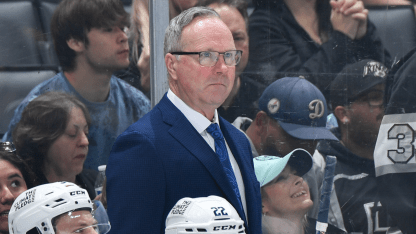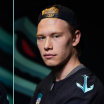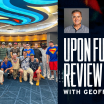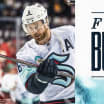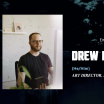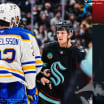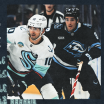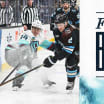To be able to be part of forming this franchise, and the identity of this team almost right from the start, how exciting was that for you? And what opportunity does that present as a coach?
Well, I think being in from the near ground floor is extremely exciting. To be able to do it as a coach, I was fortunate. I got to be able to do it as a player (with the Florida Panthers in 1993), right? But there's a lot of new. There's a lot of things when you've gone through it (that) you can offer in terms of just helping people find their way. You're new to a new city, and it's always nice to be able to see a franchise grow.
How did your experience going through that as a player help inform the way that you approach some of those relationships with the guys here?
Well, I think the big thing is you really find out how much you need and rely on each other. (When) I went through it as a player, and your families need each other. You're bringing in people that are new to the community, its survival mode, right? You forget about a lot of the little details. For us as players, it's easy. You have your network, and everything's already established, but for your families, now…you have to (find) schools. You have to find doctors…all these little things that you need in everyday life, (even just your way around town)…finding the good restaurants.
What is your approach in trying to form connections with the players, especially with guys of all ages and from all around the world?
Just be yourself. The biggest thing with players today is they want transparency. They want honesty. And, you know, I'm extremely fortunate that I've lived it. I've watched our kids who have played and play professionally in this game. So, you're fortunate that you have already that established connection and players understand.
What can you share with us about the process of getting to know new coaches as well, even if you are a little bit familiar with them from your travels?
Yeah, it's really interesting. When I first came here, I had never crossed paths with the guys that I work with. It (started with) a cold call..just out of the blue. And, It was late in terms of what we what we go through (timing wise). It was in August, and I was coming off an experience (in Winnipeg) where I was probably going to- and I was looking forward to! - taking a year off just to recharge and reset. And then I made a phone call, and this is why we're here today.
It was a call that Dave Hakstol was really quick to get back (to me). He was excited about the opportunity. I think I caught him off guard that I would actually be interested in coming into the role and the capacity that he needed. I was extremely grateful for the opportunity.
Obviously, things don't go always according to script, and there are changes. And we're fortunate to be part of the group here today.
How about that (coaching) group today? You are one of the holdovers from this coaching staff. What about all of the institutional knowledge that you were able to hold and bring to the others?
I think that number one, you get a fresh set of eyes coming in. I have experience with the players, and I have an understanding. But the one thing is, I always want coaches to be able to form their own opinions of players. We're not always going to agree on the player. We're not always going to have the same likes or dislikes with a player. But the biggest thing is I was there to provide some information. I really wanted Dan and Bob and Jess to have to make their own decisions and their own opinions on certain individuals.
And you guys share responsibilities across the coaching staff. What is the process of deciding who manages what?
Well, that's that all starts with the head coach. We had meetings prior to the season starting, and our responsibilities are laid out, and it's pretty clear what you do. But the one thing is, is you don't just get stuck doing what you're asked to do. You're there to pick up and help any way that you can.
You and Jess both work with forwards. What are those conversations like to make sure you both are giving the players a cohesive message and that you are all on the same page so there's no doubt about the message that you are delivering?
it's consistent just in conversation and the communication that we have within our office. We try and control how many voices they're hearing. And I think for players, it's extremely positive that, as coaches, we all have something to offer. But if we can simplify the message and the person giving the message that usually where the value is.
What can you share with us about your philosophy in terms of deploying the 12 forwards?
We're all of the mindset that to win in this league, you need depth. And being that we're a relatively new franchise, you need your young guys to play, but you have to put them in situations and positions to be successful. And sometimes there's going to be ups and downs with the young guys. But not only the young guys, right? There are going to be some growing pains with some of the veteran players as well, and it's all about patience and it's all about communication. And, as a staff, Dan is extremely inclusive.

